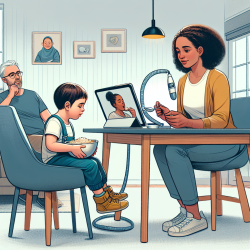As parents, our greatest wish is for our children to thrive and achieve their fullest potential. For kids with special needs, achieving this can sometimes require a village of support, including therapists who specialize in addressing their unique challenges. In our digital age, virtual therapy, also known as telepractice, has emerged as a powerful tool in providing this support, offering a flexible and effective way for children to receive the care they need. Here's how virtual therapy can benefit your child and why you might consider taking this next step.
Accessibility and Convenience
One of the most significant advantages of virtual therapy is its accessibility. Children can receive high-quality therapy sessions from the comfort of their own homes, eliminating the need for time-consuming commutes. This convenience is especially beneficial for families living in remote areas or those with limited access to specialized services.
Customized Learning Environments
Virtual therapy allows for a highly personalized approach to each session. Therapists can tailor the environment and tools used to match your child's unique learning style and needs, potentially leading to more effective sessions and better outcomes.
Engagement Through Technology
Many children are naturally drawn to technology, making virtual therapy an engaging way to capture their attention and interest. Using interactive tools and games, therapists can make learning and development fun, encouraging active participation and sustained engagement throughout the therapy process.
Consistency and Flexibility
Life can be unpredictable, but virtual therapy offers the flexibility to maintain consistent therapy sessions, even when schedules change or unforeseen circumstances arise. This consistency is crucial for children with special needs, who often benefit from routine and structure in their therapy programs.
Parent Involvement and Empowerment
Virtual therapy provides a unique opportunity for parents to be more involved in their child's therapy sessions. This involvement can lead to a better understanding of their child's needs and progress, empowering parents to support their child's development more effectively at home.
In conclusion, virtual therapy is a valuable resource for families of children with special needs, offering convenience, customization, and engagement that traditional therapy settings may not provide. If you're considering the next steps to support your child's development, exploring the possibilities of virtual therapy could be a transformative decision for your family. Together, we can unlock your child's potential and pave the way for a brighter, more accessible future.










